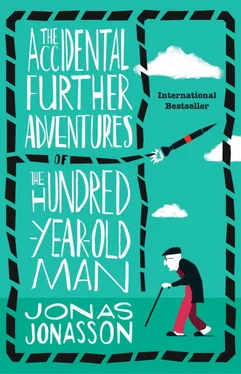Merkel added that the director of the BND must get back to her immediately with regard to whatever nuclear weapons-related activities Karlsson might be planning to take on (five hundred kilos of enriched uranium could not be thought out of existence, no matter how close to the election they were). The director blushed and admitted that he and his family were planning a trip to the Bahamas a few days later, but naturally he would be at her service during every minute of his vacation. It was just that he would be on a plane for at least ten hours, from Berlin to Nassau, and it wasn’t certain that he could keep in constant contact with the agents on-site from up there.
‘Forgive my boldness, Chancellor, but might it be reasonable to ask the East African director in charge to contact you directly in the event anything critical happens while I’m out of touch? If not, I will of course cancel my trip.’
Angela Merkel had a heart behind her chancellor mask. She didn’t want to make the director of the BND go home to his wife and children and tell them their holiday was cancelled because he had to sit by the phone.
‘Give my private number to the agent in charge in Dar es Salaam,’ she said, ‘with orders to call day or night as soon as Karlsson gets within three hundred kilometres of an enrichment facility or a suspected smuggler. Have a nice trip. Say hi to the wife and kids.’
* * *
Among the last things the director of the BND did, before taking time off for the first time in six years, was send a report to the two BND representatives who used Dar es Salaam as their base of operations. Karlsson and his crew would land at thirteen twenty hours the next day, on Ethiopian Airlines from Addis Ababa. The attached phone number went straight to the chancellor, in case of any drama, and should only be used if he couldn’t be reached.
Gennady Aksakov put down the phone following the informal intelligence call from Stockholm. Or, rather, he slammed it down. And kicked the empty chair by his side.
‘What is it, Gena?’ asked President Putin, across from him.
‘Allan fucking Karlsson, that’s what.’
‘The hundred-and-one-year-old?’
‘Yes. That bastard killed the second Nazi too. Four million euros, down the drain.’
Putin said it wouldn’t bankrupt anyone, but what had happened?
The Nazi had challenged a great number of heavily armed police officers with the Danish anti-terror force and was immediately shot to bits.
Putin quietly wondered what this had to do with the hundred-and-one-year-old. Hadn’t the alarm been sounded because of a hearse full of explosives in Copenhagen?
‘The hearse wasn’t full of anything. It was just illegally parked.’
‘Illegally parked? By whom? No, hold on. Don’t say anything. I understand.’
Olekorinko’s miracle-medicine tent city was in the Serengeti, right on the banks of the Mara River. When Allan, Julius and Sabine got into a taxi outside the airport in Dar es Salaam, they learned from the cheerful driver that it would take a day to get there by car, then half a lifetime to find their way. The Mara River had the peculiarity of being four hundred kilometres long, and the Serengeti about fifteen thousand square kilometres in size.
‘They have Lebensraum , those lions,’ said Allan.
‘We need a more accurate address,’ said Julius.
‘And some form of transportation other than a car,’ said Sabine.
It was five hundred metres from Julius Nyerere International to the domestic terminal.
Since the trio were already sitting in the taxi, they changed their order from a one-day journey to a two-minute one. The driver was no longer quite so cheerful: he’d hardly had time to switch the meter on before it had to be turned off again. He ought to have driven first and explained later.
Behind the taxi a black Passat contained two highly focused agents from the Bundesnachrichtendienst, whose task was not to let Karlsson out of their sight. And immediately to inform the top director of the BND, or alternatively the chancellor, if the elderly man got up to anything stupid.
The Congolese mine in Katanga had officially been closed for several years. The UN had seen to it. With that, the supply of uranium was cut off to the immediately adjacent nuclear research centre, which the country had once had the blessing of the United States to open as thanks for the delivery of uranium for the bombs over Hiroshima and Nagasaki, back in the forties.
No one but the United States had ever thought it was a good idea to have that type of capacity in a country where everything could be bought for the right money. But since the Americans had more of that particular commodity than anyone else, their interests came first. They had essentially bought the entire country. With money.
Eventually, however, even the USA got behind the rest of the UN’s demands for law and order in Congo. It followed that the Katanga mine and its laboratory no longer posed a threat to fragile world peace.
Or did it?
A local watchdog force, financed by none other than the UN, was tasked with making sure that no uranium prospecting activities occurred. The immediately adjacent laboratory was sealed.
At the end of each month, the head of this force, Goodluck Wilson, faxed a report to the International Atomic Energy Agency in Vienna. It always read the same: Everything is quiet, trust us . More or less.
Goodluck Wilson had hand-picked the entire rest of the force, which was made up of his three brothers and their seven most trustworthy cousins. They all had the same goal with their watchdog mission: to get filthy rich. There was no discussion of how the world would end up feeling as a result.
Each morning, four former laboratory assistants crawled up out of an underground tunnel, through the floor of the sealed centre for atomic research, to enrich whatever could be enriched. All in all fifteen people should theoretically have been sharing the profits, but in practice there were only eleven. The four assistants didn’t know that in fact an accident would befall them when they were no longer needed. The gross profits as budgeted were fifty million dollars for Goodluck and another five million each for the ten brothers and cousins. The non-existent miners received eight dollars per day, and were satisfied with this, until the western shaft collapsed on several of them six years after the mine was closed. This would likely have passed unnoticed if it hadn’t been that seventeen workers who shouldn’t have been there had demonstrably been there. And now they were dead. This was impossible to hush up. The IAEA wondered what the miners had been up to in the shaft, if everything was so quiet. Without listening to the answer, they sent observers down for a closer look.
Goodluck and his men had been planning to wait until the amount of enriched material was up to an even half-ton; that was what the North Koreans had ordered via the Russians. But now the first four hundred kilos had to be hastily encased in lead and hidden in a hut in a nearby village. There were plenty of empty huts after the latest landslide. The four laboratory assistants (including the one on the BND payroll) also managed to become victims, when the underground tunnel to the nuclear research centre collapsed, as planned, the morning before the observers from Vienna arrived.
The representatives from the IAEA found no irregularities. But they were cautious enough to exchange half the watchdog force for people who could be trusted. Or people who were not to be trusted, in Goodluck Wilson’s estimation.
Everything comes to an end sometime. The head of the watchdog force knew he couldn’t squeeze any more out of this operation. The profits topped out at eighty million dollars, more than half of which went to Goodluck. There wasn’t much to be done about it. You had to be content with the little you could get.
Читать дальше
Конец ознакомительного отрывка
Купить книгу












